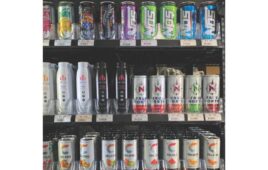 On Aug. 26, the Food and Drug Administration (FDA) lowered the hammer on approximately 35,000 flavored e-cigarette items by issuing marketing denial orders (MDOs). The ruling prohibits interstate commerce for these products, resulting in convenience stores, vape shops and tobacco retailers immediately pulling them from store shelves.
On Aug. 26, the Food and Drug Administration (FDA) lowered the hammer on approximately 35,000 flavored e-cigarette items by issuing marketing denial orders (MDOs). The ruling prohibits interstate commerce for these products, resulting in convenience stores, vape shops and tobacco retailers immediately pulling them from store shelves.
One week later, the FDA released approximately 300,000 more MDOs on flavored vape and e-cigarette products. Then, on the court-mandated deadline of Sept. 9, the FDA stated it had taken action on approximately 93% of the more than 6.5 million pre-market tobacco applications (PMTAs) accepted, including MDOs for more than 946,000 flavored vape and e-cigarette products.
“We know that flavored tobacco products are very appealing to young people; therefore, assessing the impact of potential or actual youth use is a critical factor in our decision-making about which products may be marketed,” said Acting FDA Commissioner Janet Woodcock.
“Right now, our main concern is that the FDA is aiming to clear the market of all but a handful of tobacco-derived nicotine vaping products. FDA is leaving adult smokers behind by trying to limit this category to only tobacco and menthol products. The end result will be disposables, e-liquids and pods being made with synthetic nicotine, which the (FDA) Center for Tobacco Products is not empowered to regulate,” said Gregory Conley, president of the American Vaping Association (AVA). “Efforts will eventually be made to restrict these products at the federal and state level, but as long as they remain legal, there will be a very large market for them.”
“JUUL is the one that makes me the most nervous about FDA decisions regarding the big brands. To use an old-school term, they’ve had a bullseye on their back,” said Anna Bettencourt, senior category manager for Haffner’s convenience store chain, which is owned by Energy North Inc. Headquartered in Lawrence, Mass., the company also runs car washes and foodservice sites.
It appears Bettencourt and others will have to wait a bit longer. On Sept. 9, the FDA requested additional time to make a final decision on the pod system, along with other big-name brands.
“It is absolutely absurd that the same agency that found time to ban over 6 million vaping products manufactured by small businesses is now indicating they need more time to review products with massive market shares,” said Conley in an AVA statement. “This decision brings even more uncertainty on the day FDA had previously pledged to provide the public with answers.”
The National Association of Convenience Stores (NACS), along with four other national retail associations, wrote to the FDA requesting a public release of the list of products that are receiving MDOs.
“Without this list, our retail members, who make every effort to comply with the law, do not know which products must be removed from shelves,” the NACS letter stated. “As the agency takes action on PMTAs, it is imperative that there is continued transparency in the process and that stakeholders across the tobacco trade know all of the products that have had PMTAs rejected as well as all of the products that have had marketing orders granted.”
Summer Sales
Despite the prolonged regulatory process, the category continues to post noteworthy profits. Market research firm IRI recorded nearly 33.8 million unit sales of electronic smoking devices in U.S. convenience stores for the four weeks ending Aug. 8, 2021. That’s a 15.4% increase compared with a year ago; the 52-week comparison showed a gain of 21.6%.
“Our vapor sales compared to last year are skyrocketing. This is our biggest category increase from all of our categories. JUUL is still the main force, but Vuse Alto is moving up quickly with disposable coming in very strong,” said Rick Staley, merchandising manager for Tri Star Energy, which owns and operates Twice Daily, Hightail and Sudden Service convenience stores.
On a brand comparison level, Nielson data confirms JUUL is still the top seller, with 41.1% of market share, but Vuse holds steady with 31.2% for the four weeks ending Aug. 24, 2021.
Naturally, analysts are adopting a conservative stance on the future of the vape category until the fallout from PMTA decisions settles. Meanwhile, c-store category managers no longer have the luxury of a wait-and-see approach as the FDA mandates products subject to denial orders be removed from back bars.
“Our distributors work guaranteed programs with all vendors,” said Staley, a policy he hopes will cushion possible losses.
However, it pays to be proactive, too.
There’s no definitive timeline to go with, so you have to deal with the information you have in the moment. But you also need exit strategies and you have to keep an eye on inventory,” said Bettencourt. “A lot of it is having a Plan A and a Plan B — and sometimes a Plan C.”

Update: On Oct. 12, the FDA announced that it authorized the marketing of three new tobacco products, marking the first set of ENDS products ever to be authorized by the FDA through the PMTA pathway.




